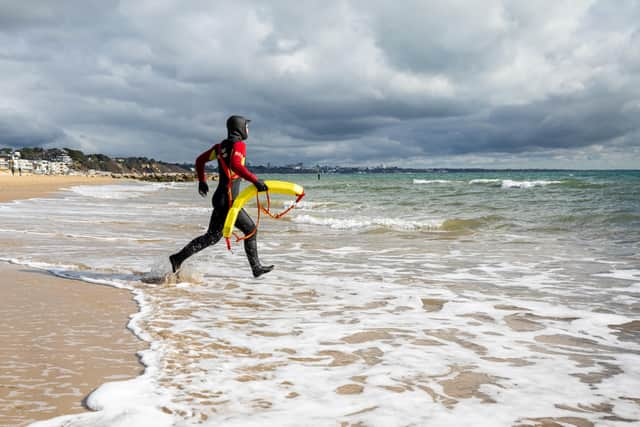RNLI lifeguards ready for a summer of ‘staycations’
and live on Freeview channel 276
The charity will deliver their usual lifeguard service across the Causeway Coast this year, in its standard phased approach. Five beaches on the Causeway Coast will go on service for the Easter period, with a daily patrol from Good Friday, April 2 to Sunday, April 11.
In 2020, RNLI lifeguards in Northern Ireland responded to 225 incidents and came to the aid of 285 people, six of whom were lives saved.
Advertisement
Advertisement
Lifeguards responded to a range of incidents and performed various actions including water rescues, casualty care and minor first aid as well as helping to reunite missing children with their families.


During last year’s season, there were approximately 358,412 visitors to RNLI lifeguarded beaches. In addition to rescues, lifeguards carried out thousands of preventative actions to keep visitors safe. This work included providing safety advice to people on weather and sea conditions as well as conducting timely interventions to ensure visitors were on the safest area of the beach and in the correct flag zone for their specific activity.
Speaking ahead of the Easter period which will see a daily patrol from 11am to 7pm on Benone, Portstewart, Portrush East, Portrush West and Whiterocks until Sunday, April 11, Karl O’Neill, RNLI Lead Lifeguard Supervisor, said: “RNLI lifeguards are at the forefront of the charity’s lifesaving work, offering preventative safety advice to visitors and rescuing those in difficulty in the water. Not only do they receive the best training but the best equipment too, so they are able to deal with any emergency situation as professional first responders.
“Each year the RNLI works in partnership with our local authorities and landowners to set up and roll out the lifeguard service, which is complex in normal times even without the challenges of doing so during a pandemic. However, we have been here before, and with the added benefit of being able to plan ahead, we have developed contingencies should things change.
Advertisement
Advertisement
“The protocols and measures introduced last year because of coronavirus will continue. We are working with local authorities and landowners, who ask us to provide a lifeguard service on their beaches, to make sure the environment for lifeguards to return to is safe. We will continue to monitor the risk to our people and the public in relation to the pandemic.”
The daily full-time seasonal service will be extended to Downhill, Castlerock and Ballycastle on the Causeway Coast from Saturday, June 26.
The RNLI is encouraging the public to follow government advice on social distancing, travel and contact with others when visiting the beach to keep themselves and lifeguards safe.
Michael Thompson, RNLI Area Lifesaving Manager, said: “RNLI lifeguards play a vital role in keeping beach visitors safe, but they can’t be everywhere, so will be supported by the charity’s 24/7 lifeboat service and water safety work. This comprehensive water safety education programme involves working with partners, local communities and the public to help everyone enjoy a safe visit to the coast.
Advertisement
Advertisement
“Coastal areas provide a great opportunity to enjoy fresh air and open space but it is important to remember it can be an unpredictable and dangerous environment, particularly during spring and early summer when air temperatures are warm but water temperatures remain dangerously cold, increasing the risk of cold water shock. We’d therefore remind anyone entering the water to take extra care and avoid unnecessary risks as early season conditions are more challenging.
“Whatever your chosen activity though, basic precautions can greatly reduce the risk of getting into difficulty, and also improve your chance of being found quickly should you need rescuing. For activities like kayaking and paddleboarding we’d recommend you carry a means of calling for help on you, such as a mobile phone in a waterproof pouch, and ensure you are wearing the right kit. A wetsuit will keep you warm and help you float in an emergency but wearing an appropriate buoyancy aid or lifejacket is still vital. For open water swimmers and dippers, please also remember to acclimatise slowly and be visible with a bright hat.”
The RNLI is urging anyone choosing to visit the coast to make sure they keep themselves and their families safe by following beach safety advice along with the government’s advice on travel and social distancing:
Visit a lifeguarded beach and swim between the red and yellow flags
Advertisement
Advertisement
Check the weather forecast, tide times and read local hazard signage to understand local risks
If you fall into the water unexpectedly, FLOAT TO LIVE. Fight your instinct to thrash around, lean back, extend your arms and legs, and Float.
In an emergency dial 999 and ask for the Coastguard.
Keep up to date with relevant water safety advice on social media by searching #RespectTheWater so that you can have an enjoyable and safe time at the coast.
If you are a local business near the coast you can help the RNLI share key water safety messages and save lives by becoming a local ambassador. As a local ambassador you can help be the eyes and ears in your community by helping the RNLI share important water safety messages with more people. To find out more visit: https://rnli.org/support-us/volunteer/volunteering-opportunities/rnli-local-ambassador